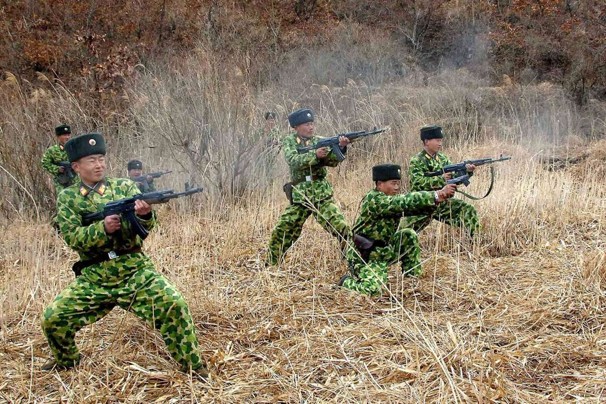The tricky thing about Kim Jong Eun
 Monday, April 1, 2013 at 11:12AM
Monday, April 1, 2013 at 11:12AM  Good WAPO piece about the ratcheting up of brinksmanship by NorKo, which has gotten so aggressive as of late that SouKo pols are discussing the nuclear option - as in, get some.
Good WAPO piece about the ratcheting up of brinksmanship by NorKo, which has gotten so aggressive as of late that SouKo pols are discussing the nuclear option - as in, get some.
I was asked this last week in a speech in Nebraska (Lincoln), and my reply was, KJE has shown a distinct willingness to open things up internally, which is a very hopeful sign. But, as with anybody in his position, he needs to show a lot of external aggression to: 1) prove himself as the new leader and 2) show his internal reforms won't result in any loss of international "stature."
The problem is, of course, that the external aggression becomes self-fulfilling, which is why the hardliners always demand it as a form of reform-snuffing activity.
We don't know yet whether KJE has any real ambition to become a Deng-like transformative figure (China's dream). We can only go off the evidence to date. And that evidence says, playing with reforms but also playing with aggression.
It's easy to go overboard in either direction, but the instinct of an authoritarian state/leader is always to err on the side of external aggression, which is why totalitarian regimes of this nature are almost impossible to reform from within.
The good upside?
It gets Korea back on the front burner and gives a rest from the growing China-v-everyone dynamic. Plus it opens up the chance for cooperation with China on a shared burden.
But for now, it's the same old, same old with no clear path ahead.
 China,
China,  Koreas,
Koreas,  US foreign policy | in
US foreign policy | in  Citation Post |
Citation Post |  Email Article |
Email Article |  Permalink |
Permalink |  Print Article
Print Article 









Reader Comments (4)
So what's China's take on all this?
I have read a comment by the Northkorean News Agency. It was an article which asked "What did Ghaddafi in return?" and draw analogies to Northkorea: Ghaddafi opened his country, made a compromise with the West and canceled his WMD programme. What was the result? He´s dead. Therefore Northkorea is very hesitant to follow the path of Ghaddafi.It wants to be an accepted nuclear power with ICBMs which can launch its sattelites before it maybe will start economic reforms.
Hi Tom,
Long-time reader, first-time blogger but we met face-to-face when you keynoted the Esri Def/Intel conference in San Diego some years ago......
I'd like your opinion, thoughts, references, analysis, etc. about what the US grand strategy on the Korean Peninsula vis-à-vis our China position should be considering the current situation?
We know that a unified Korea freaks our Chinese friends out a bit for several reasons:
1. A unified, i.e. South Korea could provide a regional competitor for China and also result in U.S. troops on it's shared 800 mile border (assuming that's how Obama, Kerry, and Panetta play it out, which I think would be pretty stupid without proper diplomacy)
2. The ethnic Koreans now living in China might decide to leave to return to their "home country" taking their collective brainpower, work ethics, and potential talents with them to a new glorious unified Korea.....
3. The enormous humanitarian crisis potential of millions of present north Koreans pouring across the border to seek refuge, food, shelter, etc. or just plain see "what life's like" in a place where globalization has been allowed to flourish.....cue up video of east Berliners in 1989......
We know what the Chinese did in Oct. 1950 when MacArthur's boys reached the 38th parallel......but that was a different time I.e. Cold war proxies....
Think we'll see a unified Korea in our lifetimes? It reminds me of your "processing political bankrupt states" talks in your PNM Trilogy (which one exactly eludes me...Blueprint maybe?) If so, how will it go down?
Thanks!
Bryant Ralston
Right now we wait to see if KJE will stick to the low-key economic reforming while keeping up the scary external behavior.
My fear is that he's another Bashar Assad and can't control the bad stuff, so the reforms fail.
China is in the driver's seat. All depends on how long it wants to put up with failure.